|
Once upon a time, the Big Game Hunter was a popular figure in literature and film. Usually, although by no means exclusively male, these humanoid creatures were the product of a bygone time when international travel for the purpose of leisure was the almost exclusive province of the obscenely wealthy. And there was little these creatures enjoyed more than trotting off to darkest Africa, as it was once insensitively labelled, and shooting the crap out of the local wildlife. The bigger and more magnificent the beast, the more these worthless toads wanted its head on the wall of their country estate. More than once I've seen this practice described as a sport, which I might just buy into were the animals fully aware of the hunters' intentions and some balance was provided by either giving the creatures rifles and teaching them to shoot or arming the hunters with only shields and knives.
It's a pastime that recently found its way into the news when an American dentist named James Walter Palmer shot and killed a lion named Cecil, who was a popular resident of the Hwange National Park in western Zimbabwe. It's a sad fact that the key reason this killing prompted international uproar is that this visually distinctive lion had been anthropomorphised by giving it a cute name so that tourists would come to think of it more as a pet than a beast. For me the most shocking thing about the whole affair was the realisation that rich white idiots are still to this day trotting off to Africa to kill wild animals for their own amusement.
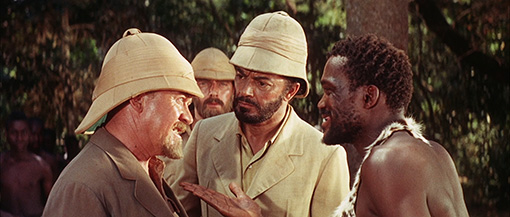
It's just such a party of big game buffoons that we meet at the start of The Naked Prey, a 1965 pulp adventure story from director and lead actor Cornel Wilde. The safari in question has been funded by an unnamed rich white berk played by South African actor Gert van den Bergh, but is managed by a similarly anonymous chap played by Cornel Wilde, who's referred to in the credits only as 'Man'. I'll get to that in a minute. They're here to hunt elephants, ostensibly for their ivory (which cuts no ice here, matey), but the Hunter is shooting anything with large ears and a trunk whether it's sporting tusks or not, something Man is not too impressed by. If you're an animal lover, you're also not likely to be jumping with joy at the footage of elephants being shot for real. In one case the animal is also stripped of its internal organs, although at least the local tribesmen actually make use of the meat rather than just pull out its teeth and leave the carcass to rot.
When the party encounters members of a local tribe, Man speaks their dialect and engages in friendly banter with their key representative. What is required here, he informs the Hunter, is a gift for their Chief, something that is customary practice in this particular district. Being a king-sized dick (and likely an Englishman abroad), however, the Hunter refuses to waste any of his resources on the local rabble and pushes brusquely past them. They do not appear to be happy with this curt dismissal of them and by association their tribal Chief. Later that day, after slaughtering enough elephants to feed Iceland for weeks, the safari camp is raided by a group of tribal warriors, who kill most of the party and haul the others back to their village. Here the survivors are subjected to a range of lethal tortures and Man is set a challenge, to run naked into the bush towards an arrow fired by one of the warriors, who will chase him down and kill him the moment he passes the point at which the arrow comes to earth. But the spear thrown by the first warrior to chase him misses its target and is snatched by Man and turned against its owner. Grabbing the dead tribesman's footwear, clothing and water, Man runs into the wilderness pursued by the remaining warriors and a cat-and-mouse battle of survival begins.
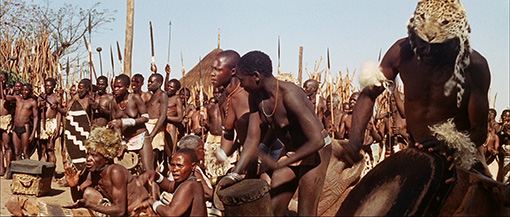
Okay, The Naked Prey was made in 1965, but even with that in mind it's impossible to ignore the attitudes to race that are reflected here. The whole concept of a 'civilised' white man threatened by 'primitive' black tribesman has its cinematic roots in the silent era but was on its last legs by the time the 1960s drew to a close. The Civil Rights movement was in full flow and tales of colonial heroism were giving way to films that took a more questioning and revisionist look at our imperial past. At its most discomforting, these works could none-too subtly suggest that Africans were not just a different race, but a sub-species of humanity. If that claim sounds outrageous then ponder for a second on the evidence for the prosecution on show here. First up is the decision to name the lead white character 'Man' and the white hunter 'Second Man'. None of the black tribesmen are graced with such a moniker. Are these not men? And then there are the shots of topless tribeswomen, something absolutely authentic to the location (the filmmakers are not at fault here) but whose inclusion in a film of this vintage inadvertently highlights the moral hypocrisy of the establishment in which Wilde was working. The Naked Prey was made at a time when on-screen nudity of any sort was strictly forbidden in western cinema, and any attempt to show even a glimpse of a naked female breast would result in censorial cuts. Let me rephrase that. Any attempt to show even a glimpse of a naked white female breast would result in censorial cuts. Read up on the reasons and its all to do with warped concepts of 'decency' and the risk of sexually exciting an audience who have no business at all being stimulated in this way. But apparently none of this applies if the woman in question is African in origin and location. What, seriously? To underline the point, when Man runs naked from the tribesman at the start of the chase, in long shot he can be seen to be wearing flesh-coloured shorts. In the eyes of the moral guardians of the time, black female breasts were fine, white buttocks were not, even from a safe distance. And this was in no way an isolated case. You'll find the same dual standard in a number of films and (especially) ethnographic documentaries of the period and even the occasional TV show – there's a projected image of a topless native women in an episode of The Avengers titled The Secrets Broker that was first broadcast back in 1963. It's worth noting, however, that one of the biggest British film successes of the period – Cy Enfield's 1964 Zulu (several of whose personnel also worked on The Naked Prey), which also pitted colonial whites against tribal warriors and had its share of topless tribal women – is to this day held in supremely hard regard.
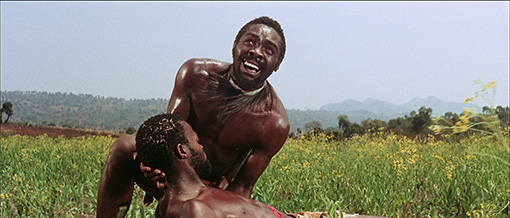
Yet the case is nowhere near as clear cut here as that lengthy preceding paragraph might seem to suggest. While the inventive (and unlikely) tortures meted out by the tribe might seem designed to cast them as a collective savage threat, once the hunt begins the film goes out of its way to individualise them and even to connect us with their emotional pain when their comrades are killed. When Man slays the first warrior and flees for his life, instead of giving immediate chase one of the slain man's fellow tribesman – we can presume from his reaction a close friend or brother – stops to cradel his body and weep for his death. Later we even get to witness his funeral. As characters they are far more sympathetic than the blustering idiot who first spiked their ire and just occasionally I found myself rooting for them over the object of their pursuit. Late in the story there's an unexpected non-verbal exchange between Man and the warrior party leader in which they each respectfully acknowledge the skills and persistence of the other, and come the film's end each of the actors playing the tribal hunters are individually recognised with their own credit and film clip, a curtain call afforded to none of the white actors.
There's almost the sense here that Wilde found himself at a political crossroads, acknowledging and even embracing the attitudes of the past whilst simultaneously making a conscious attempt to move on from them and not tell his story – if you'll forgive the blunt and painfully obvious metaphor – in purely black and white terms. He is not, after all, making a cinematic plea for equality and integration, but an old school adventure thriller that relocates The Most Dangerous Game in the African bush (the short story on which it is based – John Colter's Escape by Addison Erwin Sheldon – was actually set in the American West and pitted a white trapper against a tribe of Native Americans, but the production was forced to locate where the funding took it). That Man is able to hold his own against a band of tribal warriors on their home turf may seem a little unlikely – they repeatedly miss him with spears, knives and arrows and he fights like he spent a couple of years in gladiator school – but it's hard not to warm to the ingenuity he displays in his fight for survival. And as if to assure that his actions are not racially slanted, he at one point risks his life to save a young boy whose village is being raided by ruthless slave traders, a favour the boy is then able to return in kind.
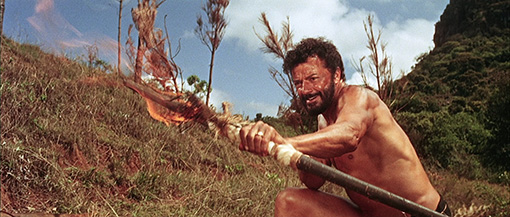
The Naked Prey is a curious but fascinating and ultimately compelling beast, a transitional film that while rooted in past societal attitudes is aware of changing times and in its own small way signposts a way forward. It's also notable for showcasing the directorial talents of its multi-talented leading man. Much of the film plays out without comprehensible dialogue (the discussions between the warriors are never translated and are left for us to interpret from their reactions and body language) and just occasionally – as with the moment Man turns his head to listen for an approaching danger and the camera glides in to focus on his ear – there's a very real sense that Wilde is keen to experiment with the storytelling potential of the film form. The repeated cutaways to animals in conflict may be overstating the symbolism, but still adds another layer to an already thoughtful approach on what could easily have been a by-the-numbers potboiler. For all its time capsule oddities, The Naked Prey proves to be an unexpectedly bold and rewarding film, a last gasp for the colonial adventure tale that makes a very real effort to acknowledge that the hunters are every bit as human as their would-be prey.
When it comes to crisp restorations, any film shot largely outside in sunlight has an instant advantage over one whose images are clouded in night-time interior gloom. The Naked Prey is just such a film and as you would now hope (or should I say expect) from a Masters of Cinema release, the 2.35:1 transfer here looks terrific, boasting a lovely level of cleanly defined detail, an earthy colour palette and really well pitched contrast. This is especially important if you are to retain detail on dark skinned faces and bodies that have been photographed in bright sunshine, something the transfer here handles with aplomb. Dust spots are rare as drinking water in the veldt, and the image sits solidly in frame throughout. A handsome job, although with the image this crisp, the stock nature footage – a blend of 35mm and 16mm material that was then blown up to fill the scope frame – is sometimes a little too easy to spot.
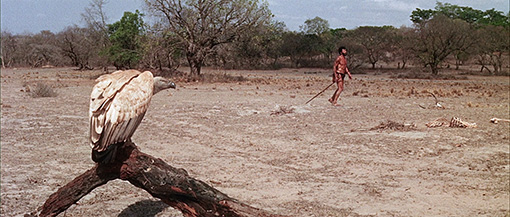
The linear PCM mono 2.0 soundtrack is also in fine shape, boasting clear rendition of the location sound (which is frankly more important than sparsely used dialogue) and there's no distracting background hiss or damage. The tribal drumming used to add tension to some sequences is particularly well rendered, with more bass than I would have expected for a film of this age.
Optional English SDH subtitles are available.
Sheldon Hall (30:54)
Following a standard "he's not speaking for us, guv" disclaimer from Paramount – from whom we can (perhaps wrongly) assume the transfer is licenced – film historian Sheldon Hall delivers exactly the sort of companion piece that anyone new to The Naked Prey and Cornel Wilde's career could hope for. In an information-loaded, half-hour chat, Hall provides plenty of detail on Wilde and the inception and making of The Naked Prey, and analyses a some of the key elements of the film – including its attitude to race – with the sort of intelligence and thoroughness which made much of what I'd written feel a little redundant. Definitely one for after you've seen the film, but immediately after, if you get my drift.
Theatrical Trailer (3:13)
A deadly serious narration sells the film as a survival thriller that was "filmed entirely in the primitive areas of Africa where no other motion picture was ever made." Are you sure?
Booklet
A nicely presented booklet kicks off with a reproduction of John Colter's Escape, the 1913 short story (and I do mean short) that inspired the film, and is followed by a detailed piece from the October 1970 issue of Films and Filming in which Wilde talks to Gordon Gow about his career and his approach to filmmaking. This is well worth a read.
A few years ago I'd have been seriously surprised to see a film like The Naked Prey released under Eureka's Masters of Cinema banner, but the label really has expanded its scope in recent years and is now liberally peppered with such pleasant surprises. As a film it's not without its challenges, but there's definitely more going on here than the standard colonial survival adventure and it's worth seeing for Cornel Wilde's direction alone. A terrific presentation of the film itself and a couple of spanking extras make this another one for the collection. Warmly recommended.
|